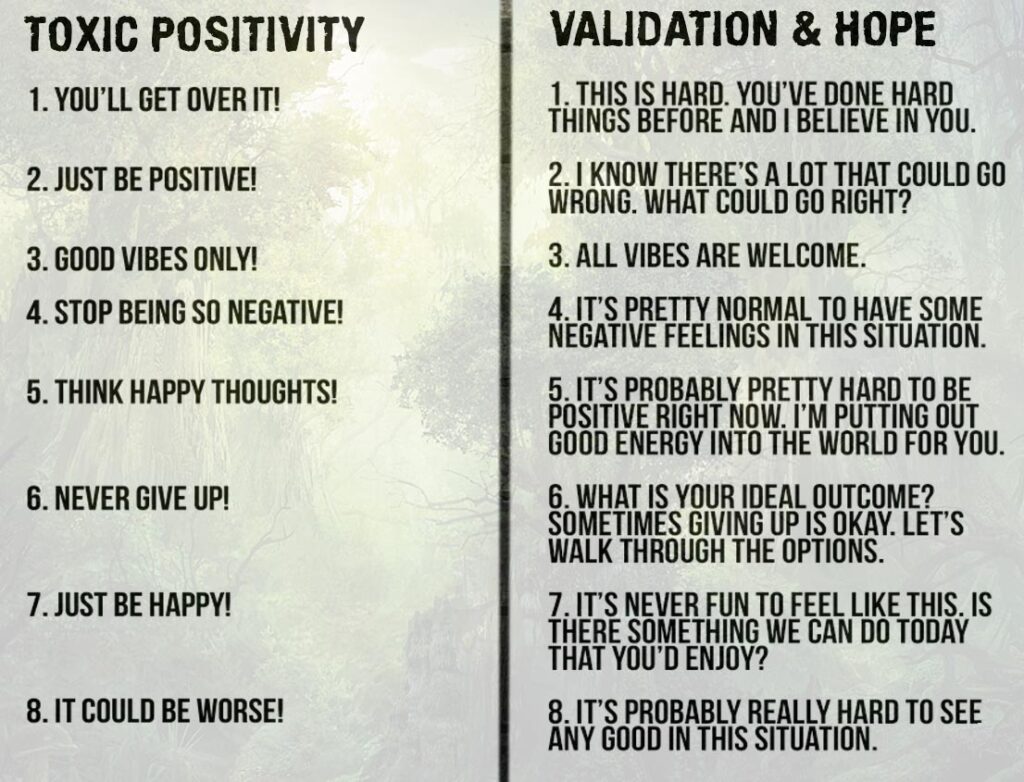What is toxic positivity and How do you deal with Toxic Positivity?

Toxic positivity is the feeling of acting happy or cheerful once you’re not. It is that fake type of happiness people say to you like, “It’ll get better, don’t stress.”
We specify toxic positivity as the excessive and ineffective overgeneralization of a joyful, optimistic state across all situations.
Toxic positivity is genuine. We are all aware that a positive outlook in life is excellent for your emotional well-being. The dilemma is that energy is not always positive. Most of us cope with painful emotions and adventures.
Toxic positivity takes positive thinking into an overgeneralized intensity. This mindset does not just stress the significance of optimism. It reduces and simplifies any hint of human emotions that are not rigorously positive or happy.
Difference Between Toxic Positivity and Validation?
Positivity is a great thing but being optimistic all the time is unhealthy. Toxic positivity is if you refuse, invalidate or minimize a negative situation by overgeneralizing the advantages. From time to time, this positivity isn’t realistic and can cause emotional suppression. As soon as we leap to positivity right away, it can be incredibly invalidating because we deny that experience. Even when we want to be positive, it is essential to acknowledge negative emotions and distress.
Validation is a vital communication skill that will make someone feel heard and space to process things. Remember that everyone is going through a stressful time at the moment. You wish to admit this by validating before being optimistic or problem-solving.
This Chart helpful to explains the difference between toxic positivity and validation
Signs of Toxic Positivity
Below are a few common expressions and toxic positivity experiences to help you recognize how it shows up in everyday life.
- Hiding/Masking your true feelings.
- Feeling guilty for feeling what you are feeling.
- Minimizing other people’s experiences feelings because they make you uncomfortable.
- Brushing off problems rather than facing them.
- Shaming or chastising others for expressing frustration or anything Aside from positivity.
- Wouldn’t dare to be seen unhappy.
- Angry and confused about negativity.
How to deal with toxic positivity.
If you feel toxic positivity effects inside you, then Some things can help you live a mentally healthy, relaxed life. Some ideas include:
1. Avoid ignoring your genuine emotions.
Acknowledge how you feel, and feel all your emotions, good or bad. It would help if you reminded yourself that sadness, anger, envy, and fear exist for a reason. We can celebrate all our emotions as a meaningful and even helpful part of being human.
It’s also a good habit of writing about how you feel.
2. Be realistic
To combat toxic positivity, take little, actionable steps to release the negative emotion accessible. For example, if you’re feeling stressed from office, take deep breaths, take rest or look from the window to clear your mind.
During times of depression, avoid engaging in new tasks that you think will make you feel better. Concentrate on things that you are already very good at instead and stick together until you feel better.
3. Communicate your feelings with others.
People who bottle up their emotions end up being more aggressive and keeping negative thoughts to themselves result in frequent emotional outbursts.
Expressing your feelings and needs to your loved ones can help you feel better about your experiences and its also improve your relationship with them.
If a person asks how you are feeling, there is no need to fake a smile and say everything is nice if it really is not. A straightforward and true response is better then fake answer.
“It’s okay not to be okay.”
You may believe that admitting you are not okay may not get you everywhere in life, which you need to suck it up and keep going. There is nothing wrong with this; admitting that you are not okay and understanding that it is alright is your initial step to letting go of this pain.
4. Limit Your Time Online
Scrolling through inspirational quotations and funny images in your feed may be a happy and also relaxing experience, but all that positivity-driven content can leave you feeling the effects of that which psychologists are now calling “toxic positivity.”
“Everyone on Instagram is happy and inspired 24/7, they’re absolutely not.”
Social media can pinch toxic positivity even more. No, we’re not requesting you to leave all social networks but optimize the content intake. If you attempt to reduce 1 hour from what you are consuming now, the results would be fantastic. For this, you can spend a bit more time on your own and feel the genuineness of feelings.
5. Focus on listening to others and showing your support
When someone expresses a problematic emotion, do not shut them down with toxic platitudes. Instead, let them understand that what they’re feeling is regular and that you are there to listen.
You are listening to someone and showing that you care that person space to feel Appreciated and heard.
“Being supportive and being positive don’t always have to go together.”
Conclusion:
Start looking at toxic statements in your daily life and let yourself and others feel both positive and negative emotions.
We get a chance to live this beautiful, painful, incomplete life. Embrace every emotion of it completely, it will reward you for a full life.





